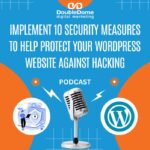By admin

In this episode, we delve into ten essential security measures to safeguard your WordPress website against hacking attempts. Key topics include:
-
Investing in Reputable Security Software: Protect your business network with comprehensive security programs designed for commercial use, defending against viruses, malware, and other online threats.
-
Choosing a Secure Hosting Provider: Select a hosting company that implements robust server security measures to prevent unauthorized access and data breaches.
-
Enforcing Strong Password Policies: Implement stringent password requirements, including length and complexity, to enhance account security.
-
Implementing SSL/TLS Encryption: Secure data transmission between your website and its visitors by obtaining SSL/TLS certificates, adding an extra layer of protection to online transactions.
-
Utilizing Two-Factor Authentication: Enhance login security by requiring a second form of verification, making it more difficult for unauthorized users to gain access.
-
Regularly Updating Plugins and Removing Unsupported Ones: Keep your website’s plugins up to date and remove outdated or unsupported plugins to minimize security vulnerabilities.
-
Limiting Login Attempts: Reduce the risk of brute-force attacks by restricting the number of unsuccessful login attempts allowed before locking the account.
-
Terminating Inactive User Accounts: Deactivate or remove user accounts that have been inactive for an extended period to prevent potential exploitation.
-
Maintaining a Comprehensive Security Plan: Develop and regularly update a security plan outlining protocols and responses to potential hacking incidents.
By the end of this episode, you’ll be equipped with actionable strategies to enhance your WordPress website’s security and protect it from potential cyber threats.








